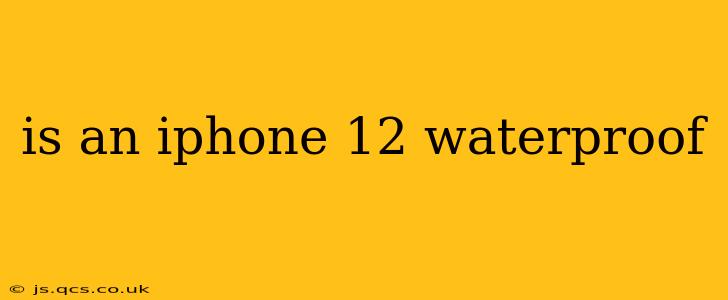The question of whether an iPhone 12 is waterproof is a common one, and the answer isn't a simple yes or no. While Apple markets its iPhones as water-resistant, understanding the nuances of this claim is crucial to protecting your investment. This article will explore the iPhone 12's water resistance capabilities, addressing common concerns and offering practical advice.
What does "water-resistant" actually mean for the iPhone 12?
The iPhone 12 boasts an IP68 rating for water resistance. This rating signifies that the device can withstand submersion in up to 6 meters of freshwater for up to 30 minutes. Crucially, this is not the same as being waterproof. An IP68 rating protects against accidental splashes, rain, and brief submersions, but it doesn't guarantee survival in all water-related scenarios.
What are the limitations of the iPhone 12's water resistance?
Several factors limit the iPhone 12's water resistance and could compromise its functionality:
-
Type of water: The IP68 rating applies specifically to freshwater. Saltwater, chlorinated pool water, and other liquids can cause damage more easily due to their corrosive properties. The minerals and chemicals in these waters can seep into the device's seals and internal components, leading to malfunctions over time.
-
Depth and duration: Exceeding the 6-meter depth or 30-minute time limit significantly increases the risk of water damage. Even staying within these limits doesn't offer absolute protection. Pressure at depth can affect seals, and prolonged exposure weakens the device's defenses.
-
Water temperature: Extreme water temperatures, both hot and cold, can also impact the effectiveness of the water seals.
-
Physical damage: Any pre-existing cracks, scratches, or damage to the phone's seals will significantly reduce its water resistance, making it far more vulnerable.
-
Water pressure from activities: Activities like swimming or water sports, even at shallower depths, create significant water pressure that can surpass the limits of the IP68 rating.
Will Apple repair my iPhone 12 if it gets water damaged?
Apple's warranty does not cover liquid damage. While they might assess the damage, repairs resulting from water exposure will typically incur significant costs. This is why preventative measures are so vital.
How can I protect my iPhone 12 from water damage?
Preventing water damage is far easier and less expensive than repairing it. Here are some practical steps:
-
Avoid submerging it: Treat your iPhone 12 as water-resistant, not waterproof. Avoid taking it swimming, showering, or into situations where it could be submerged.
-
Use a waterproof case: Investing in a high-quality waterproof case adds an extra layer of protection, significantly increasing your phone's resilience against water damage.
-
Clean it carefully after accidental exposure: If your iPhone 12 gets splashed or briefly exposed to water, gently wipe it dry with a soft, lint-free cloth, paying attention to ports and openings. Avoid using heat to dry it.
-
Don't use your phone underwater: Even if you think your phone is waterproof, using it while submerged is a significant risk.
Does the iPhone 12's water resistance degrade over time?
Yes, the seals and components responsible for water resistance can degrade over time due to normal wear and tear and exposure to various elements. This is another reason to take preventative measures.
Is the iPhone 13 more waterproof than the iPhone 12?
While both phones have an IP68 rating, the iPhone 13 has a slightly improved water resistance rating against submersion in freshwater. The exact difference is not significantly advertised by Apple, and it is not substantial enough to suggest drastically different levels of water protection. Both models should be treated with the same level of care concerning water exposure.
By understanding the limitations of the iPhone 12's water resistance and following these precautions, you can significantly reduce the risk of water damage and extend the life of your device. Remember, water resistance is not waterproofing – taking proactive steps is always the best approach.
